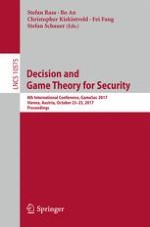2017 | OriginalPaper | Buchkapitel
On the Cost of Game Playing: How to Control the Expenses in Mixed Strategies
verfasst von : Stefan Rass, Sandra König, Stefan Schauer
Erschienen in: Decision and Game Theory for Security
Aktivieren Sie unsere intelligente Suche, um passende Fachinhalte oder Patente zu finden.
Wählen Sie Textabschnitte aus um mit Künstlicher Intelligenz passenden Patente zu finden. powered by
Markieren Sie Textabschnitte, um KI-gestützt weitere passende Inhalte zu finden. powered by
